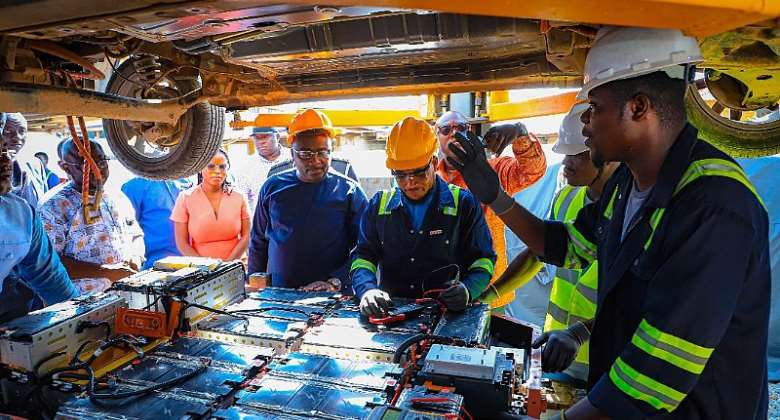Ghana‘s Vice President, Dr. Bawumia, has announced that the government is working on a policy framework to promote the use of electric vehicles (EVs) in public transportation. The initiative aligns with Ghana’s goals of reducing greenhouse gas emissions and lowering transportation costs.
Transitioning to Electric Vehicles
Dr. Bawumia expressed his vision for Ghana’s public transport to shift entirely from reliance on petrol and diesel to fully embracing electric vehicles. He emphasised the feasibility of this transition and stressed the importance of adopting EVs as a matter of government policy.
Dr. Bawumia made these remarks during a visit to Solar Taxi, a Ghanaian electric vehicle assembly company located in Accra. Solar Taxi, founded in 2018, specialises in assembling and manufacturing electric cars, motorcycles, buses, and battery packs for electric vehicles. The company has supplied 500 electric vehicles to the Ghanaian market and operates with a workforce, 90% of whom are female.
Solar Taxi also possesses the capability to convert traditional petrol or diesel-powered vehicles into electric ones, offering a sustainable and eco-friendly transportation solution. The company provides financing options for EVs, including motorcycles, cars, and buses, allowing customers to pay over time without collateral.
Reducing Transportation Costs and Environmental Impact
During his visit, Dr. Bawumia highlighted the importance of addressing climate change and transitioning from fossil fuels to green energy sources. He noted that Ghana spends a significant amount on fossil fuels, which significantly contributes to high transportation costs. By adopting electric vehicles, fuel costs can be significantly reduced, and the nature of electric vehicle engines requires minimal maintenance, further lowering costs.
While acknowledging that transitioning to electric vehicles may present challenges, Vice President Bawumia emphasised the potential benefits for Ghana. These benefits include lower transportation prices, savings on foreign exchange, job creation, and opportunities for youth training in EV maintenance.
Read also: Ghana Police Service introduces Traffictech-GH System to detect traffic offenses
Vice President Bawumia praised the founders of Solar Taxi for their commitment to innovation and entrepreneurship. He encouraged the development of a curriculum for technical and vocational education and training (TVET) institutions to prepare individuals for careers in EV maintenance.
Addressing Inflation and Economic Implications
Dr. Bawumia emphasised that fuel and transportation costs are key drivers of inflation in Ghana. Any increase in these costs has ripple effects on other economic variables, such as exchange rates, food prices, and utility expenses. Transitioning to electric vehicles can help stabilise transportation costs and reduce inflationary pressures.
Government Support and Collaboration:
The Vice President assured Solar Taxi and similar initiatives of the government’s commitment to collaborating and providing support to address any challenges. He expressed optimism about Ghana’s potential to lead in electric vehicle manufacturing and praised the dedication and innovation of the country’s youth.
Ghana’s push for electric vehicles in public transportation is part of broader efforts to reduce emissions, lower costs, and create economic opportunities. Solar Taxi’s role as a pioneering electric vehicle company in Ghana exemplifies the country’s commitment to sustainable transportation solutions.
A Sustainable Transportation Future
Ghana’s government is actively exploring policies to promote the adoption of electric vehicles in public transportation. This move is in line with the country’s objectives of reducing greenhouse gas emissions and cutting transportation costs. Solar Taxi, a Ghanaian electric vehicle company, is at the forefront of this transition, assembling electric cars, motorcycles, buses, and battery packs. The government sees the shift to electric vehicles as an essential step towards reducing the cost of living for Ghanaians, improving environmental sustainability, and creating economic opportunities. Challenges exist, but the potential benefits far outweigh them, making a sustainable transportation future with electric vehicles an attainable goal for Ghana.















